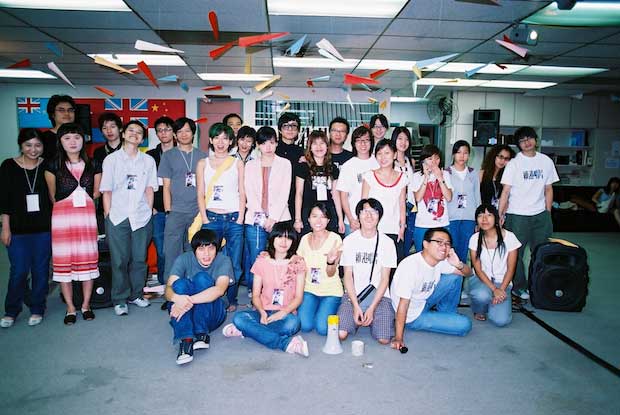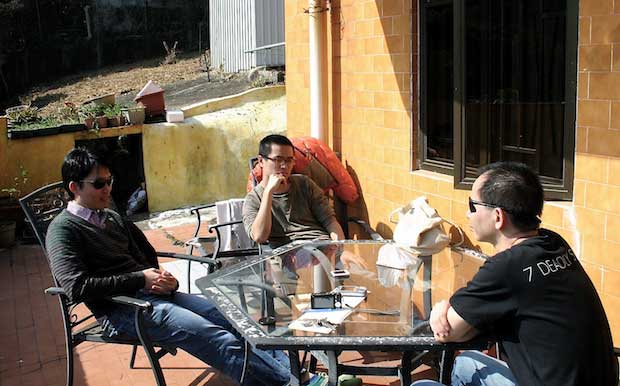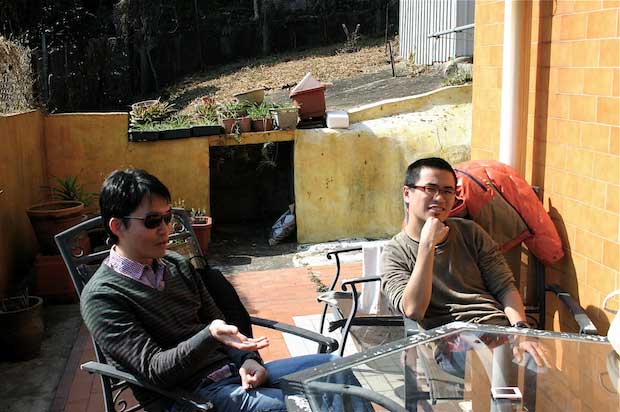Bun Ng takes you back through Hong Kong’s independent music history, to dig through the cold past and uncover some of the scene’s warmest moments and memories.
If you’re serious about indie music in Hong Kong, you would have heard of Harbour Records (維港唱片), or have intimate knowledge of the label, or even know the people in the label. To me Harbour Records started with “The Five Tigers” (五虎), which are the owners/core of the label. The proper five tigers were Human Head Horse (人頭馬), JoyTrendySound (在草地上), 22Cats (22貓), My Little Airport and False Alarm. And if you were attentive, you would have noticed that bands outside of these five released on the label include Caffeine Park (咖啡因公園), Wilson Tsang, Audrey Lily and Kim Tak Building (儉德大廈).

We dissociate the last artists with the five tigers because they only released the albums at Harbour Records. But the Five Tigers are the collective that formed Harbour Records. Which is the story.
And even if we need to focus on the five tigers, we would quickly find out that there are no longer five tigers on Harbour Records (even though today on their web site there is still the five tigers menu). And that’s the starting point where I grabbed a couple of representatives (who are willing to join a conversation) from Harbour Records. Specifically, I ended up talking with Ling (False Alarm) and Kit (22Cats) both proprietors of the record label.
To give a little background, the five tigers, plus a dedicated administration non-band proprietor (Alva), were equally and evenly the owners of the organization. That would make up a total of 13 heads. Eventually, JoyTrendySound left the label; the spiritual leader of the band, Ming (陳銘) always had his own label Poch Records and he just decided he could do his own things better on his own. Today, with the departure of some False Alarm members, there are a total of 8 co-owners who share this fame as one of the weirdest owners of a business organization.

However, this is unfair. Ling said when we sat outside my home on a bright sunny afternoon, “you should think of us as a commune instead of a business. We just share our works with no expectation of any gains.”
Ok, that sums it up, and I guess the article could have ended here.
Yes, how did that start, though? You’re right. There were interesting incidents and timeline, but back in the summer of 2003, after False Alarm having released their first CD (meaning it was not on Harbour), the co-owners met in different circumstances. “False Alarm wanted to play more shows, or even host some shows,” said Ling. “But we had no idea how to organize a show, so we had a couple of shows in our band room. And from then on, all the key people would have met in different ways, so when we repeated that summer show in Christmas, the opportunity afforded all of us to have discussed this idea that we could simply share our workload. It was as innocent as everyone agreeing that, let the one with that area of talent to serve everyone else on the label, so that we wouldn’t need to repeat each process all over again when someone released an album. I was good at design, so I did design. Other guys simply did the other relevant things.” As such Alva was the administration and P.R. representative, while Kit became the technology expert who put each release in every shop in the market, local and overseas.

“The benefit is obvious,” said Kit. “When one single band deals with a shop regarding the sales of their CD, the quantity could get so small it was difficult to manage. But if we work with the shops based on 5 to 10 records, it would be easier and far more cost-effective even for each individual shop.”
One of the key ingredient of Harbour Records was the legendary 90s band AMK, The first moment of getting together was at an AMK tribute show, and it was agreed that everyone met at that show. Kwan King Chung (關勁松) was one of the three (equally important) members of AMK. He was basically Human Head Horse, a project (band?) he started after AMK with another indie legend Alok. The song “骷髏舞” is still available for download (like a relic) on the Harbour Records web site. That would also explain (as if it needs explaining) why the reissued boxset “AMK history” was issued on Harbour Records.

My initial impression of Harbour Records was that it was not a serious business venture on the merit of having a brand like “the five tigers”. “Well, it was obviously not serious”, Kit said. “Our first batch of slogans were about getting rich with Harbour Records. You cannot get any further from serious if you had that as your motto” (in the indie music business, that is). In fact, I spent a few tens of minutes on the business side of possible wins, possible loses in running this label the way they do, and in the end, Ling said, “the key is, from day one, we all know that there was no money to be made, and really, I think that’s why we sticked together, because if not, we simply could not have been doing this for this long.”
When Harbour Records released an album, different people go to work. They don’t rush it out. If you’re late on producing a certain portion, everyone else just waits (as if there’s no deadline/rush). A small portion of the revenue would go into the Harbour Records funds, some of which would be spent on marketing, based on the band’s preferences. Majority of the profit goes right back to the bands. Bands who choose to release with Harbour Records don’t need to “sign” with the label. Ling said jokingly, “We have a very loose relationship. Let’s say, if there are a few cartons of CDs not sold, we might just say to the artist, why don’t you keep them with yourself instead of leaving them with us?”

“There would also be plenty of bands who don’t see us as a good label to work with, and we also cannot possible handle a lot of work,” Kit said. “Some bands figured out very early on that we’re not a proper label, and not even a distributor, so that wouldn’t be their first choice. But I would gladly give them all the necessary contact to get an album release done on their own.”
So it comes to pass that people would depart for various reasons. Do they find themselves having insufficient manpower now? In fact, time has changed. Certainly, with time, the Harbour crew have the know-how and are doing everything faster now, but more importantly, some of the marketing works are no longer necessary. “In the early days, we gave the radios our CDs, and we did road tours of specific places like bookstores. Radios turn out to be irrelevant to the success of indie music, our sampler CDs tend to quickly find their ways to second hand record stores (because they have the word “Sampler” stamped on them). The chains of bookstores have also closed down.” And in particular, about radio, Kit said, “even if we reached a certain chart position, what does that mean? Rachel Believes In Me also charted at the same position as Dido. Did it sell the same quantity as Dido?” followed by a wave of laughter from both of them.

Harbour Records is quite a closely-knit family. I once chatted with a friend who also reaches across to all sort of indie bands and he drew the parallel to the English-speaking bands in Hong Kong. Two fine example of people who do not cross over to the other’s territory. They clearly enjoy the smooth and comfortable music environment/niche that they have created. Today, with False Alarm having disbanded (don’t tell me you don’t know), the core bands of Harbour Records are only My Little Airport and 22Cats. I will now officially leave the Harbour Records story as we start a new story.
So why did Por of 22Cats release his solo album and his side project Rachel Believes In Me with POCH Records?
You might remember we covered POCH Records earlier on? If I ever call up Harbour Records, right? I would always call up Por first. To me, he is the face of Harbour Records (to me, that is). So yes, Por did NOT, lets look at it from another angle, did NOT release his own work and his side work at his own Harbour Records.
And Kit just entered turbo mode. “The exact reason why Por did not release his albums with Harbour is because he just wanted to release the albums and forget about it. He didn’t want to promote it, he didn’t even want to do radio interview. And that’s how Ming works. Ming just has a love to help people release an album, he gets you the recording, the mixing, the printing, everything very quickly. So Por went to Ming.”
Indeed, if you try to look up the information on POCH Records, it does not have a web site, not a Facebook page, it has nothing. Not a thing.
‘BUT,” Kit added, “that does not mean Ming would release anything, don’t get me wrong. He works with friends and in other cases he’s selective who to work with.”
“In the end,” Kit entered another laugh mode, “it was still the same Harbour Records team who finds the distribution channel, or does the standard web promotion. So you can say, it’s all the same. Look at our CD release events, you still have the Ming and team (typically member of The Evening Primrose) selling CDs, but they’re not related to Harbour Records officially. So, it’s still all the same.”
Yes, the Harbour Records story is actually the story of two record labels. Both fascinating. I never talked to Ming much. Every time I asked him one question, he would politely explain to me that he’s very busy, so let’s talk at another moment, when he had time he would call me back. He looks to be a very private person, and I think I’ll simply leave it at that. You can’t ask me much about POCH Record, that’s what I mean.
We had a whole two hours conversation, eventually joined by publisher Edwin, so we couldn’t have only touched on so few topics. Yet, I’ll end it here with a snippet. Harbour Records released two free compilations; the first one was called “We Wish You An Indie Christmas” in 2006. The second one was “Listen To The People” in 2009, both available in free download (but not from the Harbour Records web site, don’t try). They are mostly songs recorded for a theme. “WEYAIC” was given out at a Harbour Records Christmas party and in that effort every member of every participating band would print 10 CD-Rs and cover of the album, so you can figure there were plenty of copies made, but each one slightly different in packaging. Afterwards it was offered on line for free. “LTTP” was a project initiated by Lam Ah P (My Little Airport) because at that time there was a general voice of protest all round for various social issues. So a collection of mainly protest songs was born.
Will they continue to do that?
“Yes, we are happy to release and we certainly will when another opportunity come sup,” said Ling. “We have recorded many shows and I always thought it’s a good idea to release them, but in many cases the bands may not clear the release. I suppose it’s much easier with the False Alarm final show, because I would be the only one to call the shot.”
I will now end on the positive note and a promise. Harbour Records, I hope this is not too misrepresenting.
-Bun
[table id=7 /]
![[樂評] 文藝復興基金會《女流》音樂計劃 (2015)](http://bitetone.com/wp-content/uploads/2015/05/rfhk-tds-3girls60x60.jpg)
![[樂評] 莫西子詩 (Moxi Zishi)《原野》(2014)](http://bitetone.com/wp-content/uploads/2014/12/专辑封面62x62.jpg)
![[樂評] 腰《相見恨晚》(2014)](http://bitetone.com/wp-content/uploads/2014/09/waist62x62.jpg)
![[樂評] 戳麻 (Chock Ma)《自在本性》(2014)](http://bitetone.com/wp-content/uploads/2014/06/chockma-album-cover62x62.jpg)
![[樂評] 逆流 (Ni Liu)《續世•說》(2014)](http://bitetone.com/wp-content/uploads/2014/05/nl_cd_cover62x62.jpg)
![[樂評] 黃建為 - 太陽花民歌專輯 (2014)](http://bitetone.com/wp-content/uploads/2014/04/sunflower62x62.jpg)
![[樂評] 合輯 - 臺灣獨立音樂反核輯 不核作](http://bitetone.com/wp-content/uploads/2014/03/nonukes62x62.jpg)
![[樂評] 陳綺貞 -《時間的歌》(2013)](http://bitetone.com/wp-content/uploads/2014/01/cover62x62.jpg)
[hot on a cold day] I want to talk about an indie record label – Harbour Records (維港唱片)
Bun Ng takes you back through Hong Kong’s independent music history, to dig through the cold past and uncover some of the scene’s warmest moments and memories.
If you’re serious about indie music in Hong Kong, you would have heard of Harbour Records (維港唱片), or have intimate knowledge of the label, or even know the people in the label. To me Harbour Records started with “The Five Tigers” (五虎), which are the owners/core of the label. The proper five tigers were Human Head Horse (人頭馬), JoyTrendySound (在草地上), 22Cats (22貓), My Little Airport and False Alarm. And if you were attentive, you would have noticed that bands outside of these five released on the label include Caffeine Park (咖啡因公園), Wilson Tsang, Audrey Lily and Kim Tak Building (儉德大廈).
We dissociate the last artists with the five tigers because they only released the albums at Harbour Records. But the Five Tigers are the collective that formed Harbour Records. Which is the story.
And even if we need to focus on the five tigers, we would quickly find out that there are no longer five tigers on Harbour Records (even though today on their web site there is still the five tigers menu). And that’s the starting point where I grabbed a couple of representatives (who are willing to join a conversation) from Harbour Records. Specifically, I ended up talking with Ling (False Alarm) and Kit (22Cats) both proprietors of the record label.
To give a little background, the five tigers, plus a dedicated administration non-band proprietor (Alva), were equally and evenly the owners of the organization. That would make up a total of 13 heads. Eventually, JoyTrendySound left the label; the spiritual leader of the band, Ming (陳銘) always had his own label Poch Records and he just decided he could do his own things better on his own. Today, with the departure of some False Alarm members, there are a total of 8 co-owners who share this fame as one of the weirdest owners of a business organization.
However, this is unfair. Ling said when we sat outside my home on a bright sunny afternoon, “you should think of us as a commune instead of a business. We just share our works with no expectation of any gains.”
Ok, that sums it up, and I guess the article could have ended here.
Yes, how did that start, though? You’re right. There were interesting incidents and timeline, but back in the summer of 2003, after False Alarm having released their first CD (meaning it was not on Harbour), the co-owners met in different circumstances. “False Alarm wanted to play more shows, or even host some shows,” said Ling. “But we had no idea how to organize a show, so we had a couple of shows in our band room. And from then on, all the key people would have met in different ways, so when we repeated that summer show in Christmas, the opportunity afforded all of us to have discussed this idea that we could simply share our workload. It was as innocent as everyone agreeing that, let the one with that area of talent to serve everyone else on the label, so that we wouldn’t need to repeat each process all over again when someone released an album. I was good at design, so I did design. Other guys simply did the other relevant things.” As such Alva was the administration and P.R. representative, while Kit became the technology expert who put each release in every shop in the market, local and overseas.
“The benefit is obvious,” said Kit. “When one single band deals with a shop regarding the sales of their CD, the quantity could get so small it was difficult to manage. But if we work with the shops based on 5 to 10 records, it would be easier and far more cost-effective even for each individual shop.”
One of the key ingredient of Harbour Records was the legendary 90s band AMK, The first moment of getting together was at an AMK tribute show, and it was agreed that everyone met at that show. Kwan King Chung (關勁松) was one of the three (equally important) members of AMK. He was basically Human Head Horse, a project (band?) he started after AMK with another indie legend Alok. The song “骷髏舞” is still available for download (like a relic) on the Harbour Records web site. That would also explain (as if it needs explaining) why the reissued boxset “AMK history” was issued on Harbour Records.
My initial impression of Harbour Records was that it was not a serious business venture on the merit of having a brand like “the five tigers”. “Well, it was obviously not serious”, Kit said. “Our first batch of slogans were about getting rich with Harbour Records. You cannot get any further from serious if you had that as your motto” (in the indie music business, that is). In fact, I spent a few tens of minutes on the business side of possible wins, possible loses in running this label the way they do, and in the end, Ling said, “the key is, from day one, we all know that there was no money to be made, and really, I think that’s why we sticked together, because if not, we simply could not have been doing this for this long.”
When Harbour Records released an album, different people go to work. They don’t rush it out. If you’re late on producing a certain portion, everyone else just waits (as if there’s no deadline/rush). A small portion of the revenue would go into the Harbour Records funds, some of which would be spent on marketing, based on the band’s preferences. Majority of the profit goes right back to the bands. Bands who choose to release with Harbour Records don’t need to “sign” with the label. Ling said jokingly, “We have a very loose relationship. Let’s say, if there are a few cartons of CDs not sold, we might just say to the artist, why don’t you keep them with yourself instead of leaving them with us?”
“There would also be plenty of bands who don’t see us as a good label to work with, and we also cannot possible handle a lot of work,” Kit said. “Some bands figured out very early on that we’re not a proper label, and not even a distributor, so that wouldn’t be their first choice. But I would gladly give them all the necessary contact to get an album release done on their own.”
So it comes to pass that people would depart for various reasons. Do they find themselves having insufficient manpower now? In fact, time has changed. Certainly, with time, the Harbour crew have the know-how and are doing everything faster now, but more importantly, some of the marketing works are no longer necessary. “In the early days, we gave the radios our CDs, and we did road tours of specific places like bookstores. Radios turn out to be irrelevant to the success of indie music, our sampler CDs tend to quickly find their ways to second hand record stores (because they have the word “Sampler” stamped on them). The chains of bookstores have also closed down.” And in particular, about radio, Kit said, “even if we reached a certain chart position, what does that mean? Rachel Believes In Me also charted at the same position as Dido. Did it sell the same quantity as Dido?” followed by a wave of laughter from both of them.
Harbour Records is quite a closely-knit family. I once chatted with a friend who also reaches across to all sort of indie bands and he drew the parallel to the English-speaking bands in Hong Kong. Two fine example of people who do not cross over to the other’s territory. They clearly enjoy the smooth and comfortable music environment/niche that they have created. Today, with False Alarm having disbanded (don’t tell me you don’t know), the core bands of Harbour Records are only My Little Airport and 22Cats. I will now officially leave the Harbour Records story as we start a new story.
So why did Por of 22Cats release his solo album and his side project Rachel Believes In Me with POCH Records?
You might remember we covered POCH Records earlier on? If I ever call up Harbour Records, right? I would always call up Por first. To me, he is the face of Harbour Records (to me, that is). So yes, Por did NOT, lets look at it from another angle, did NOT release his own work and his side work at his own Harbour Records.
And Kit just entered turbo mode. “The exact reason why Por did not release his albums with Harbour is because he just wanted to release the albums and forget about it. He didn’t want to promote it, he didn’t even want to do radio interview. And that’s how Ming works. Ming just has a love to help people release an album, he gets you the recording, the mixing, the printing, everything very quickly. So Por went to Ming.”
Indeed, if you try to look up the information on POCH Records, it does not have a web site, not a Facebook page, it has nothing. Not a thing.
‘BUT,” Kit added, “that does not mean Ming would release anything, don’t get me wrong. He works with friends and in other cases he’s selective who to work with.”
“In the end,” Kit entered another laugh mode, “it was still the same Harbour Records team who finds the distribution channel, or does the standard web promotion. So you can say, it’s all the same. Look at our CD release events, you still have the Ming and team (typically member of The Evening Primrose) selling CDs, but they’re not related to Harbour Records officially. So, it’s still all the same.”
Yes, the Harbour Records story is actually the story of two record labels. Both fascinating. I never talked to Ming much. Every time I asked him one question, he would politely explain to me that he’s very busy, so let’s talk at another moment, when he had time he would call me back. He looks to be a very private person, and I think I’ll simply leave it at that. You can’t ask me much about POCH Record, that’s what I mean.
We had a whole two hours conversation, eventually joined by publisher Edwin, so we couldn’t have only touched on so few topics. Yet, I’ll end it here with a snippet. Harbour Records released two free compilations; the first one was called “We Wish You An Indie Christmas” in 2006. The second one was “Listen To The People” in 2009, both available in free download (but not from the Harbour Records web site, don’t try). They are mostly songs recorded for a theme. “WEYAIC” was given out at a Harbour Records Christmas party and in that effort every member of every participating band would print 10 CD-Rs and cover of the album, so you can figure there were plenty of copies made, but each one slightly different in packaging. Afterwards it was offered on line for free. “LTTP” was a project initiated by Lam Ah P (My Little Airport) because at that time there was a general voice of protest all round for various social issues. So a collection of mainly protest songs was born.
Will they continue to do that?
“Yes, we are happy to release and we certainly will when another opportunity come sup,” said Ling. “We have recorded many shows and I always thought it’s a good idea to release them, but in many cases the bands may not clear the release. I suppose it’s much easier with the False Alarm final show, because I would be the only one to call the shot.”
I will now end on the positive note and a promise. Harbour Records, I hope this is not too misrepresenting.
-Bun
[table id=7 /]